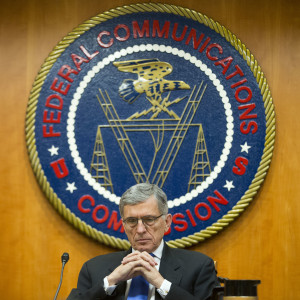While speaking about the court challenge to the agency’s net neutrality regulations Wednesday the top lawyer at the Federal Communications Commission said the FCC didn’t violate the law when it redrafted the rules following input from the White House.
At a conference held by the nonprofit policy think tank Free State Foundation Wednesday, FCC General Counsel Jonathan Sallet dismissed the view widely held in conservative and telecommunications industry circles that the FCC caved to pressure from the Obama administration in its decision to reclassify Internet service providers as public utilities.
“It’s totally appropriate for people to make their views known to us,” Sallet said. “That included millions of Americans, that included many members of Congress from both parties, that included the president of the United States.”
The suspicion was the subject of a recent report by Senate Republicans citing emails between agency staff, which found the FCC completed a draft of its net neutrality ruling minus reclassification in November 2014, but quickly changed course after President Obama publicly called on the agency to adopt Title II common carrier authority over wired and wireless broadband providers.
Subsequent back-and-forth meetings and communication between the White House and the FCC unreported by the agency, as is mandated by federal law to safeguard its independence, led Republicans to conclude the FCC likely violated the Administrative Procedure Act — a federal statute requiring agencies to open the regulatory process to public scrutiny.
“As we explained in our brief, the comments of the president were filed with us entirely in accordance with the Administrative Procedure Act,” Sallet said.
President of FSF Randolph May during a question-and-answer session with Sallet cited some of the FCC lawyer’s own work from 2011 that he thought contradicted the regulatory approach his agency took in adopting the 2015 Open Internet Order.
“Without preemptive regulatory intervention, the market will tend to provide numerous benefits in innovation, price, and general consumer welfare,” Sallet wrote in a paper discussing broadband regulation. “Moreover, the boundaries of the Internet marketplace are not sufficiently stable for regulation to have a reasonably predictable effect over time, which should be a prerequisite for predictive rulemaking.”
Sallet goes on to suggest a light-touch, case-by-case approach to regulating broadband would serve the Internet ecosystem best due to its quickly evolving, fluid nature. Adopting hardline inflexible rules — like the three bright line, preemptive rules banning Web traffic throttling, content blocking and paid prioritization — could inadvertently slow the invention of new business models and technology, he warned.
“Because rulemaking may incorrectly predict the source or extent of those benefits, the risk of stifling competition and innovation is not worth taking in the Internet marketplace,” the paper reads. “Adjudication and a more ‘common law’ approach that can learn and respond to the developing Internet marketplace is better suited for policing competition in that space.”
Sallet said the FCC began looking at the three bright-line areas in a 2005 policy statement, and after years of examining and analyzing the market, felt confident in moving forward with the net neutrality rulemaking.
“We now understand enough about these practices that we can give specific guidance because we understand the facts,” Sallet said, adding the FCC maintains its status as an expert agency by understanding what’s going on in the marketplace.
The FCC lawyer said the rules and the general conduct standard uphold FCC Chairman Tom Wheeler’s idea of “permissionless innovation,” in that providers like T-Mobile don’t have to ask the FCC for permission before offering a new product like its “Binge On” zero-rating video service (which May pointed out is the subject of an FCC inquiry over potentially violating the net neutrality general conduct rule).
“In none of these circumstances did anyone have to ask before they acted,” Sallet said. “In fact, in all of them, they acted — people brought new products to the marketplace.”
Sallet said he doesn’t think the rules will have a “chilling effect” on new innovations in the broadband market.
“The fact is, in these instances, there was permissionless innovation, and the innovation has reached consumers,” Sallet said. “And by the way, how it plays out in the market provides greater understanding to the commission, and I think everyone else in the ecosystem.”
Sallet led the FCC’s defense of the broadband industry’s court challenge against the rules in December, which Wheeler said last week he expects judges will decide “in the next few weeks.”

